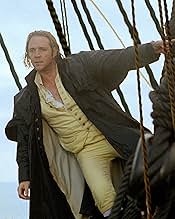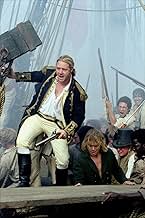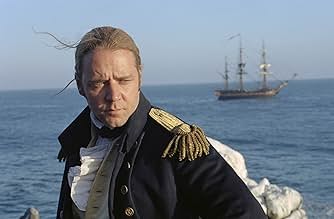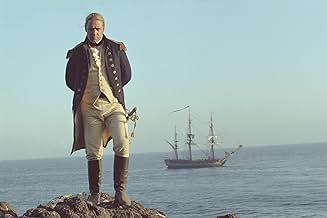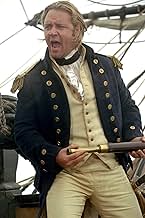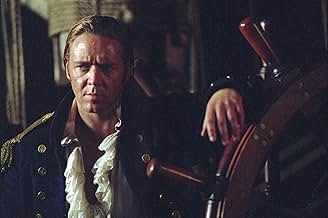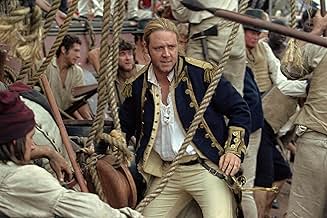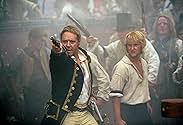Master and Commander : De l'autre côté du monde
Titre original : Master and Commander: The Far Side of the World
Pendant les guerres napoléoniennes, un capitaine britannique impétueux pousse son bateau et son équipage à bout à la poursuite d'un formidable navire de guerre français en Amérique du Sud.Pendant les guerres napoléoniennes, un capitaine britannique impétueux pousse son bateau et son équipage à bout à la poursuite d'un formidable navire de guerre français en Amérique du Sud.Pendant les guerres napoléoniennes, un capitaine britannique impétueux pousse son bateau et son équipage à bout à la poursuite d'un formidable navire de guerre français en Amérique du Sud.
- Réalisation
- Scénario
- Casting principal
- Récompensé par 2 Oscars
- 23 victoires et 90 nominations au total
Avis à la une
Few films manage to capture the era in which the original work was set and often rely on clichés of the particular genre at the expense of the core story. This film manages to avoid these pitfalls but more importantly serves as a worthwhile historical document. Anyone who is new to this period of history will not go far wrong keeping a copy of this movie as the attention to detail is excellent and adds to the experience as a whole (teachers take note).
This movie manages to tread a fine line between gritty realism and Boy's Own, portraying the pursuit of an elite French warship by an older embattled British frigate. The production values are very high and the dialogue and length allow the director a better than average framework for character development. The predominantly unknown British supporting cast (some aged as young as 12) are expertly handled and provide a counter balance to the excellent performances of Crowe and Bettany. Crowe's delivery is very reminiscent of Richard Burton, exuding a measured screen presence without overpowering the dialogue.
It would have been easy for the director to read through the salty notes of previous period pieces and deliver the usual tale of ocean going brutality and scurvy encrusted woe but Peter Weir's version of order through respect and camaraderie is far more believable especially when you realize that the sailor's greatest enemy was the ocean itself.
I found little to dislike and much to admire. Highly recommended.
This movie manages to tread a fine line between gritty realism and Boy's Own, portraying the pursuit of an elite French warship by an older embattled British frigate. The production values are very high and the dialogue and length allow the director a better than average framework for character development. The predominantly unknown British supporting cast (some aged as young as 12) are expertly handled and provide a counter balance to the excellent performances of Crowe and Bettany. Crowe's delivery is very reminiscent of Richard Burton, exuding a measured screen presence without overpowering the dialogue.
It would have been easy for the director to read through the salty notes of previous period pieces and deliver the usual tale of ocean going brutality and scurvy encrusted woe but Peter Weir's version of order through respect and camaraderie is far more believable especially when you realize that the sailor's greatest enemy was the ocean itself.
I found little to dislike and much to admire. Highly recommended.
And surprised I was. After hearing a friend rant endlessly about it, and having nothing to do one Friday night, I rented Master and Commander. The marketing staff should be cackling in glee, that a female in her 20's, would love this movie. It's an amazing movie. Russell Crowe is a force of nature, and all the other actors from Paul Bettany to Billy Boyd give wonderful performances. I especially enjoyed the details of life at sea, though most would call them boring. The day after my 5-day rental, I had to run to the nearest shop and buy the DVD, and have since re-watched it endlessly. I've never seen a more beautifully adapted, filmed and acted movie. Five stars out of five.
In April 1805, Napoleon rules Europe. British frigate H.M.S. Surprise under the command of Captain Jack Aubrey (Russell Crowe) is ordered to intercept French Privateer Acheron. In the first battle, Aubrey quickly discovers that Acheron is actually bigger, faster and more powerful skippered by a smart tactician. He escapes only through his skills and experience. After being soundly beaten, Aubrey decides to keep going instead of returning to base to refit. The ship's surgeon and Aubrey's friend Dr. Stephen Maturin (Paul Bettany) clash with him more and more as the far ranging battle continues.
The action is exciting and more realistic than sail seafaring battle movies before it. The most compelling are the splinters that fly everywhere. It is the CGI that pushes the envelop on this action. Realism is everywhere. It is dirty, ugly, bloody, and horrifying. Russell Crowe delivers a solid performance to anchor this movie in reality. Then there are the everyday things that happen in between the battles. This has the epic scale conflicts but the human size struggle.
The action is exciting and more realistic than sail seafaring battle movies before it. The most compelling are the splinters that fly everywhere. It is the CGI that pushes the envelop on this action. Realism is everywhere. It is dirty, ugly, bloody, and horrifying. Russell Crowe delivers a solid performance to anchor this movie in reality. Then there are the everyday things that happen in between the battles. This has the epic scale conflicts but the human size struggle.
The British Navy ruled the waves throughout the nineteenth century and this film captures some of that spirit rather well. The cast is excellent, Crowe in particular shining as the captain. The battle scenes between Anglo-French vessels are very entertaining, the cannons blasting great big holes into enemy ships! The story itself is not going to set the world on fire, but its all done very nicely. The film offers a glimpse of what life at sea was like during the Napoleonic Wars and anybody with an interest in history should catch the film. A few more battles would have been nice, but there you go! It's over 2 hours long, but doesn't drag. One to watch definitely.
Normally, I do not begrudge someone their opinion about a movie, but when they cast aspersions about other reviewers here, I feel compelled to respond. One disgruntled reviewer of this film stated that she cannot understand how anyone could like this movie, let alone love it. Further, she claimed that we, the other reviewers, only believe what we are told to believe. Nothing could be further from the truth.
That someone would loathe what others have lauded is not surprising, really. I have to admit that I, too, have disliked films that were highly rated by a large majority of film critics. 'Fargo' comes to mind as does 'Moulin Rouge' and 'Mystic River.' However, unlike the reviewer, I watched these films several times over before reaching a final judgment in the event that I had been too hasty in my initial impressions. Neither of these films, though, were hailed as classics like 'MASTER AND COMMANDER'
Many people go into a theatre with a preconceived notion of what they think they will see, only to be disappointed when what they see is not what they expected. Each person carries with them their own set of experiences and no amount of explanation or arguments will change their mind, either. Yet, once in awhile a movie transcends the boundaries that define it, and its true genius is not something that everyone is going to apprehend. This is the case with 'MASTER AND COMMANDER'.
All I can say to that reviewer is simply, 'I am really sorry that you were not able to see what I saw.'
Movies like 'MASTER AND COMMANDER' only come around once in a generation. It is, without question, the finest movie ever made about tall ships. However, its greatness lies not in the story line but in those elements that typically ruin what would otherwise be great historical films, namely: dialogue, special effects, and sound track. Take for example, 'Gangs of New York.' The cinematography and sets were outstanding but the dialogue of everyone but Daniel Day-Lewis was severely lacking in historical authenticity. Another example is the 'Passion of the Christ' which used a mix of Aramaic and Hebrew to add its authentic feel, but it came across as highly artificial.
'MASTER AND COMMANDER' brought to life a language totally forgotten: the language of the sea, circa early 1800's. Every actor spoke the language as if they were born into it, and that element alone made the viewer feel as if they were viewing a window in time of a world rarely seen.
The sound editing alone was worth the price of admission. I have never been to a film where I actually felt that I was part of the environment. 'MASTER AND COMMANDER' did that, and even if you play the DVD on a plain TV, you would still marvel at the realism of the sound.
Finally, unlike every other sea movie that preceded it, the special effects were seamlessly integrated into the real footage of the ships at sea. At no time, did I get the sense that I was watching a scale model in a tank. In reality, the actual ship passed through rough seas on its journey around the Horn and these real scenes were added to the movie.
All these factors I mentioned above set the movie apart but that does not mean it had a substandard plot and mediocre acting. On the contrary, Russell Crowe was at his best playing Lucky Jack Aubrey with a panache that could only be matched by the late Errol Flynn. If I were a seaman aboard the HMS Surprise, I would truly feel that I could follow him anywhere. Crowe commands both the stage and the ship wherever he goes.
Paul Bettany as Jack's most trusted friend and the ship's doctor, turns in his best performance to date. Another unusual part of this movie is that while no seagoing fare would be complete without a love affair, the one in this movie is a platonic one between the captain and the doctor.
The two have a special relationship that is constantly strained by Crowe's call to duty and his overarching ambition. Having served with the great Lord Nelson, Lucky Jack does his best to emulate him and carve out a piece of British naval history for himself.
The film reminded me of works like 'Run Silent, Run Deep' which although dealt with more contemporary battles at sea (WWII), also featured a classic battle of wits between unseen adversaries. We never get to meet Jack's nemesis directly, but we learn by his battle tactics that he is a worthy opponent and a lot like Jack himself.
'MASTER AND COMMANDER' is a movie that I never tire of watching, and each time I see it I learn something new. It has its weaknesses like every movie does. It lacks continuity and subplots. It lacks character development of some of the more interesting supporting actors. Often I found it hard to keep track of who is who when everyone is referred to by their last names. Yet, all in all, 'MASTER AND COMMANDER' is a must-see movie and a must-own DVD.
That someone would loathe what others have lauded is not surprising, really. I have to admit that I, too, have disliked films that were highly rated by a large majority of film critics. 'Fargo' comes to mind as does 'Moulin Rouge' and 'Mystic River.' However, unlike the reviewer, I watched these films several times over before reaching a final judgment in the event that I had been too hasty in my initial impressions. Neither of these films, though, were hailed as classics like 'MASTER AND COMMANDER'
Many people go into a theatre with a preconceived notion of what they think they will see, only to be disappointed when what they see is not what they expected. Each person carries with them their own set of experiences and no amount of explanation or arguments will change their mind, either. Yet, once in awhile a movie transcends the boundaries that define it, and its true genius is not something that everyone is going to apprehend. This is the case with 'MASTER AND COMMANDER'.
All I can say to that reviewer is simply, 'I am really sorry that you were not able to see what I saw.'
Movies like 'MASTER AND COMMANDER' only come around once in a generation. It is, without question, the finest movie ever made about tall ships. However, its greatness lies not in the story line but in those elements that typically ruin what would otherwise be great historical films, namely: dialogue, special effects, and sound track. Take for example, 'Gangs of New York.' The cinematography and sets were outstanding but the dialogue of everyone but Daniel Day-Lewis was severely lacking in historical authenticity. Another example is the 'Passion of the Christ' which used a mix of Aramaic and Hebrew to add its authentic feel, but it came across as highly artificial.
'MASTER AND COMMANDER' brought to life a language totally forgotten: the language of the sea, circa early 1800's. Every actor spoke the language as if they were born into it, and that element alone made the viewer feel as if they were viewing a window in time of a world rarely seen.
The sound editing alone was worth the price of admission. I have never been to a film where I actually felt that I was part of the environment. 'MASTER AND COMMANDER' did that, and even if you play the DVD on a plain TV, you would still marvel at the realism of the sound.
Finally, unlike every other sea movie that preceded it, the special effects were seamlessly integrated into the real footage of the ships at sea. At no time, did I get the sense that I was watching a scale model in a tank. In reality, the actual ship passed through rough seas on its journey around the Horn and these real scenes were added to the movie.
All these factors I mentioned above set the movie apart but that does not mean it had a substandard plot and mediocre acting. On the contrary, Russell Crowe was at his best playing Lucky Jack Aubrey with a panache that could only be matched by the late Errol Flynn. If I were a seaman aboard the HMS Surprise, I would truly feel that I could follow him anywhere. Crowe commands both the stage and the ship wherever he goes.
Paul Bettany as Jack's most trusted friend and the ship's doctor, turns in his best performance to date. Another unusual part of this movie is that while no seagoing fare would be complete without a love affair, the one in this movie is a platonic one between the captain and the doctor.
The two have a special relationship that is constantly strained by Crowe's call to duty and his overarching ambition. Having served with the great Lord Nelson, Lucky Jack does his best to emulate him and carve out a piece of British naval history for himself.
The film reminded me of works like 'Run Silent, Run Deep' which although dealt with more contemporary battles at sea (WWII), also featured a classic battle of wits between unseen adversaries. We never get to meet Jack's nemesis directly, but we learn by his battle tactics that he is a worthy opponent and a lot like Jack himself.
'MASTER AND COMMANDER' is a movie that I never tire of watching, and each time I see it I learn something new. It has its weaknesses like every movie does. It lacks continuity and subplots. It lacks character development of some of the more interesting supporting actors. Often I found it hard to keep track of who is who when everyone is referred to by their last names. Yet, all in all, 'MASTER AND COMMANDER' is a must-see movie and a must-own DVD.
Le saviez-vous
- AnecdotesRussell Crowe learned to play violin for the film and referred to it as the hardest thing he'd ever done for a film.
- GaffesDuring the Storm when the Surprise is chasing the Acheron around Cape Horn, Barrett Bonden is shown alone at the wheel. It was customary on a Royal Navy vessel of the time to always have at least two men at the wheel both as a security measure in case one man was injured in battle, and because the rudder itself was extremely heavy and difficult to turn. During any sort of heavy weather there would certainly have been four or more men at the wheel as one man would not be able to control the rudder (which is why the ship has two connected wheels).
- Citations
[Toasting]
Capt. Jack Aubrey: To wives and sweethearts.
Officers: To wives and sweethearts.
Capt. Jack Aubrey: May they never meet.
- Crédits fousThere are no opening credits.
- ConnexionsEdited into Spisok korabley (2008)
- Bandes originalesGhost of Time
Composed by Iva Davies, Christopher Gordon and Richard Tognetti
Performed by Iva Davies and Icehouse
Featured Violin Performance by Richard Tognetti
Orchestrated by Christopher Gordon
Meilleurs choix
Connectez-vous pour évaluer et suivre la liste de favoris afin de recevoir des recommandations personnalisées
- How long is Master and Commander: The Far Side of the World?Alimenté par Alexa
- Why does the young man that explores the island with the doctor talk about the distance across the island in miles instead of kilometers?
- When the "Surprise" was becalmed, the crew had hoisted a bunch of different colored flags. Why and what did they mean?
- During the first engagement, why did they lower the lifeboats into the water before the engagement even started, or, for that matter, before they even knew there would be one?
Détails
- Date de sortie
- Pays d’origine
- Sites officiels
- Langues
- Aussi connu sous le nom de
- Capitán de mar y guerra: La costa más lejana del mundo
- Lieux de tournage
- Sociétés de production
- Voir plus de crédits d'entreprise sur IMDbPro
Box-office
- Budget
- 150 000 000 $US (estimé)
- Montant brut aux États-Unis et au Canada
- 93 927 920 $US
- Week-end de sortie aux États-Unis et au Canada
- 25 105 990 $US
- 16 nov. 2003
- Montant brut mondial
- 211 622 535 $US
- Durée2 heures 18 minutes
- Couleur
- Mixage
- Rapport de forme
- 2.39 : 1
Contribuer à cette page
Suggérer une modification ou ajouter du contenu manquant

Lacune principale
What was the official certification given to Master and Commander : De l'autre côté du monde (2003) in India?
Répondre






